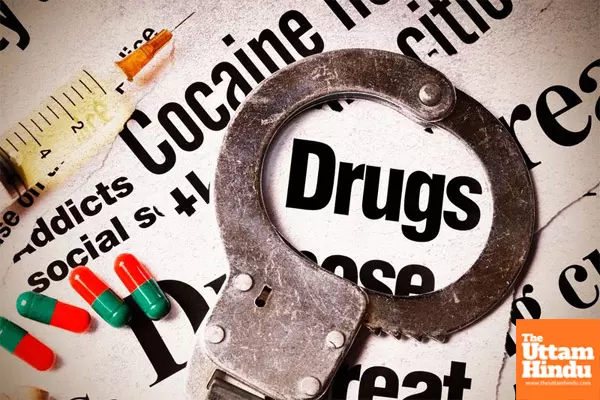
New Delhi (The Uttam Hindu) : In one of the most significant drug busts in recent history, the Narcotics Control Bureau (NCB) has dismantled a major drug cartel operating across Punjab, Uttarakhand, Himachal Pradesh, and Delhi. After a four-month long operation, law enforcement seized narcotics worth a staggering Rs 547 crore and arrested 15 individuals connected to the cartel. The operation targeted a complex network of drug diversion activities spanning several states and involved the seizure of over 1.42 crore Tramadol and Alprazolam tablets, 2.9 kg of Tramadol powder, and more than 9 lakh bottles of Codeine-based cough syrup. The drugs were allegedly being distributed across various parts of northern India and were intended for illegal sale in several key cities.
The Cartel's Operations and Connections
The investigation has revealed startling details about the cartel's operations. The main accused, who previously ran illegal operations in Delhi, had shifted his base to Himachal Pradesh after facing pressure from authorities. However, he continued his operations under the names of his associates’ companies to avoid detection. By using front companies, the cartel operated under the guise of legitimate businesses, making it difficult for law enforcement to trace their activities.
A Four-Month Long Sting Operation
The Amritsar Zonal Unit of the NCB spearheaded the operation, which lasted for several months and involved meticulous planning and coordination across multiple states. According to a senior NCB officer, the operation was “strategic and involved extensive surveillance, intelligence gathering, and inter-state coordination” to unravel the cartel’s far-reaching network. The cartel's illicit operations included the manufacturing and diversion of pharmaceutical drugs like Tramadol, an opioid painkiller, and Alprazolam, a medication commonly prescribed for anxiety disorders. These were being smuggled into the market and sold without prescriptions, leading to widespread misuse. Codeine-based cough syrups, a common substance abused for its intoxicating effects, were also being diverted into the illegal market.
Union Home Minister’s Statement
Union Home Minister Amit Shah lauded the efforts of the NCB, calling the bust a significant achievement in the country’s war on drugs. In a statement, Shah said: "Bharat is axing down drug cartels with ruthless aggression. The Amritsar Zonal Unit of the NCB axed a drug diversion cartel through a 4-month-long operation across 4 states, seizing drugs worth Rs 547 crore and arresting 15. It is a giant stride towards building a drug-free Bharat under the vision of Prime Minister Narendra Modi. Congratulations to Team NCB." Shah further emphasized the government's commitment to eradicating the drug menace and reiterated that such operations would continue to intensify.
A Growing Threat of Drug Diversion in India
The operation underscores the growing threat posed by drug diversion networks operating within India. Pharmaceutical drugs, particularly opioids and sedatives, have become increasingly common in the illicit drug trade, contributing to the rise in substance abuse among youth across the country. These drugs are often diverted from medical facilities, either through theft or illegal procurement, and sold on the black market. Tramadol and Alprazolam, which are widely prescribed for pain relief and anxiety, respectively, are particularly concerning due to their highly addictive nature. Over the last few years, their abuse has become a significant issue in several states, particularly in the northern regions.
The Road Ahead: Strengthening Enforcement
The NCB’s success in dismantling this cartel is seen as a major victory, but authorities stress that the fight against drug cartels is far from over. Drug diversion, smuggling, and illegal trafficking remain persistent challenges, with many such networks still operating under the radar. To combat these growing threats, experts have called for stronger regulatory oversight over pharmaceutical sales, greater public awareness of the dangers of substance abuse, and enhanced cooperation between state and central law enforcement agencies. The NCB and other law enforcement agencies have also been pushing for more public awareness campaigns to educate people about the dangers of drug abuse. Experts believe that addressing the root causes of addiction, including lack of education, unemployment, and social factors, will go a long way in preventing future drug misuse.
Narcotics experts argue that strengthening laws around the sale and distribution of prescription medications, coupled with increased monitoring and regulation, could significantly reduce the flow of illicit substances into the black market. This successful operation is a testament to the effectiveness of India’s law enforcement agencies in tackling the growing drug crisis. The dismantling of such large-scale cartels not only reduces the availability of illicit drugs but also sends a strong message to drug traffickers operating in the country. As India moves forward in its war on drugs, the continued vigilance of agencies like the NCB and stronger coordination across states will be key in ensuring that such syndicates are rooted out, making the country safer for its citizens.
